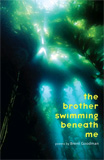December 30, 2009THE BROTHER SWIMMING BENEATH ME
Review by Sean Patrick Conlon
Black Lawrence Press
P.O. Box 327
Theresa, NY 13691
ISBN 1934703397
2009, 63 pp., $14.00
http://www.blacklawrencepress.com/
the brother swimming beneath me is an exciting collection of poems from Brent Goodman. Largely autobiographical, it contains familiar stories of loss and lust, self-discovery and self-loathing, coming of age and coming out. While this is Goodman’s debut collection, it’s important to note his list of previous publications, which reads a lot like a “who’s who” of important literary journals, both online and in print (Poetry, Anti-, Slipstream, The Adirondack Review, and, of course, Rattle, to name a few). While publication in any one of these journals might indicate an excellent poem or two, inclusion in so many established publications, each with their own set of poetic tastes and values, indicates a potent and capable poet who knows how to approach each of his chosen subjects with an appropriate voice.
Indeed, what is most striking about Goodman is his protean flexibility. Throughout the brother swimming beneath me, the style expertly shifts between topic, form, and mood, from aching loss to hilarious self-parody. In “Lice,” the sexual tension of two young boys plays like hot breath on your neck; this piece is immediately followed by the laugh-out-loud funny “First Queer Poem,” an inspired send-up in sonnet form, the last lines of which perfectly parody the queer narrative with delectable pithiness:
How dramatic my coming out, tears blurring my eyes.
Father puts his fork down. My mother feigns surprise.
The rapidly shifting voice continues through the first two thirds of the book, keeping readers on their toes. While the poems can be radically different from one another, there are common observations and values that keep the book from feeling disjointed or schizoid. While the speaker of each poem may alternately be laughing, crying, or experimenting with abstractions, the author remains clearly established as young, queer, male, thoughtful and empathetic.
As the narrative unfolds, more of Goodman’s life story is revealed in tantalizingly small portions. The way in which he has laid out his poems is enticing and original. Rarely in works of poetry do we see use of foreshadowing as potent. For instance, the first time we see Goodman’s titular brother alive in the narrative is in, “Blood Poisoning,” a story of Goodman’s near-death as a small child from an infected dog bite:
…This was my small
death, one which would eventually swallow
him entirely.
Letting this bit of information slip, Goodman does not introduce his brother’s condition until much later in the book, keeping the reader invested in finding out more, and glued to the work. By the time we reach the masterful title piece, we are prepared for the laying bare of Goodman’s burden. This is the axis around which all the other stories are set to spin, and what we find is far from the typical, dramatically wrought moment of painful loss, but rather, a subtle rumination on the way that the dead can permeate our lives, invade our thoughts, haunt us subtly and constantly:
his footprints disappear before I can put down my own
though I can still hear him rising, rising
In this moment, we understand fully the poet’s struggle to be a man in his brother’s eternal shadow. Although he has said nothing outright about his troubled coming of age, we are intimately aware of it.
Following this portion of the book, Goodman loses a little bit of his inventiveness. The last third of the collection is devoted to a series of short prose poems. While any one of these poems would have been an acceptable addition to the existing collection, the inclusion of 20 such poems seems a bit much. The free-thought discussion of various topics, each with a kind of uniformly frenetic narration, is a conceit that grows old by the end of the book, and as such ends the collection on an unfortunate note. That said, the effect of the book is relatively unharmed; while the last section may seem meandering, it cannot diminish the sheer genius of the first two thirds. Overall, this book is a triumph, a truly brilliant first outing with a remarkable new poet.